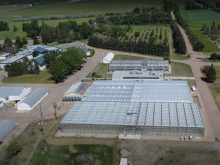Regulations affecting farms in Manitoba are starting to snap together like the pieces of a puzzle and the picture that is emerging worries people like David Rolfe.
He points to three pieces of provincial legislation that he believes could thwart livestock development in the province, especially when taken together. They include the water protection act, amendments to the province’s planning act and manure management regulations.
“It seems like livestock agriculture in this province is targeted in several areas within these three pieces of legislation,” said Rolfe, president of Keystone Agricultural Producers, during the group’s general council meeting in Brandon April 13.
Read Also

Alberta crop diversification centres receive funding
$5.2 million of provincial funding pumped into crop diversity research centres
The water protection act is aimed at protecting water quality and improving water management across the province. The proposed planning amendment act tackles the thorny issue of where and how livestock developments should be located and approved.
Both pieces of legislation have gone through at least first reading in the Manitoba legislature. The implications for agriculture are not yet clear.
“There are a lot of unanswered questions in this legislation,” Rolfe said, referring to the planning amendment act. “There are a lot of grey areas.”
Among the concerns with planning is that farmers could be the casualties of efforts to more closely identify where further livestock development should be allowed in the province and where it should be restricted. At the KAP meeting, it was asked whether farmers in the latter situation might be forced out of business if they could not expand to capture market opportunities or economies of scale. It was also suggested that their land values might plummet.
“Should there be some form of compensation for people who find themselves in that situation?” Rolfe said.
The manure management rules have been in place for years but are becoming more strict.
KAP vice-president Ian Wishart said the province emphasizes that nitrogen and phosphates are concerns for water quality. While many factors can add those nutrients to water, the act seems to point the finger at agriculture as the place where controls are needed. Wishart noted that road salts are excluded from the proposed regulations.
“You can’t help but feel they decided agriculture would deal with water quality issues and the rest of the industries would be ignored.”
On top of all that, farmers in recent years have witnessed a surge in efforts by the federal fisheries department to identify and protect fish habitat on the Prairies. KAP is negotiating for a balance so regulations do not make it costly and difficult to maintain agricultural drainage that also provides fish habitat. The farm group wants an assurance that costs to protect fish habitat during maintenance of drains will not be borne solely by producers.
“We’ve got to really push hard for our rights on this one,” said Scott Hunt, a cattle producer from Hartney, Man., and a director with the Manitoba Cattle Producers Association.














